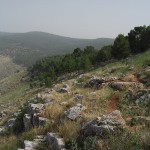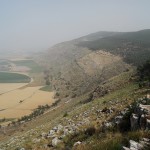Mount Gilboa (Israel)
Mount Gilboa – is a mountain range 17 kilometers long and 550 meters high above sea level; it is in the most north-eastern section of Samaria and at the southern border of the Jezreel Valley. Here the borders of the three tribes of Israel met – Issachar, Zebulun and Naphtali. The mountain is historically related to the name of King Saul, who fought and died here with his sons, among whom was Jonathan, a close friend of the future king David.
Saul, whose name means asked for, or requested for, the first king of the Israelites, lived approximately between 1095-1055 before Christ. His story is narrated in 1 Samuel, chapters 9 through 31.
Saul was a son of a noble Jew, whose name was Kish, from the tribe of Benjamin. He was tall in stature (he was taller than all the other people from his head and up), and there was no one more handsome than he among the Israelites.
Soon after Saul was anointed to be a king, Samuel summoned the people to choose a king. Lots were thrown. It pointed out on Saul, and he was announced as the king. The people, being fascinated with his stature and beauty, shouted with admiration, “Long Live the King!”
When Saul was set as the king, Samuel told all the people, “If you fear Jehovah and serve Him and listen to His voice and not rebel against the commandment of Jehovah, and if both you and the king who reigns over you follow Jehovah, Your God, the hand of Jehovah will not be against you. But if you do not listen to the voice of Jehovah, but rebel against the commandment of Jehovah, then the hand of Jehovah will be against you.”
In the first years of his reign, Saul walked according to the will of God, proving himself to be worthy of the selection. By his many victories over the enemies he won the love of the people. But when he stopped following the commandments of God and became proud, the Spirit of God departed from him and Saul became sulky and ill-tempered.
Samuel mourned for Saul. The Lord told him, “How long will you mourn for Saul? Go to the city of Bethlehem, there, between the sons of Jesse I have selected for Myself a king.” Samuel went to Bethlehem and, according to God’s instruction, anointed David as a king, who was a son of Jesse, from the tribe of Judah. The Spirit of God came down upon David. David, the youngest son of Jesse, was blonde, with beautiful eyes and a handsome face. He was smart and brave, had a meek and kind heart, and was known for his good skill of playing harp.
David became the armor bearer and favorite musician of the king, who already knew that he had been rejected by God, but he did not suspect yet that this pleasant-looking young man was his successor. Samuel had already anointed David as a king and kept it in secret from everybody, but the will of God or even the ritual of anointing did not mean that David would start ruling immediately. Quite often the gift promised from above comes to a man only through great strain. This is how it was with David also.
Meanwhile, the Israelites were going to war against their constant enemies – the Philistines. As it was the habit quite often in the ancient times, the Philistines offered to have a duel between two mighty warriors and set forth their fighter, whose name was Goliath. This warrior was almost three meters tall, according to the Bible’s record, and his weapons and armour were unrivaled.
King Saul had to respond to the challenge thrown at them, for that was one of the reasons why the Israelites asked for a king – so that he would head up his people in a war. But the king, who turned out to be unworthy of his calling before God, could not fulfill his responsibilities before the people either. And then young David volunteered to fight – the new king of Israel, whom nobody had known at that time. He stood out to fight with the regular weapon of shepherds – a sling, and struck his rival with a smart shot before the latter could come near him. That is how Goliath forever became the symbol of a strong, but clumsy giant, who is defeated by a lightly armoured, but quick and smart opponent. Maybe, it was due not only to the fighting qualities, but also to David’s words, which he said before the fighting match, “You come to me with sword and spear and javelin, but I come to you in the name of Jehovah of hosts, the God of the ranks of Israel.” The shepherd boy, who once protected his flock from predators, became the weapon of God to protect the people of Israel.
After the victory, Saul had to reward the youth, and the king gave his daughter Micah to him, but he realized that since then David had become his top rival, because the people, while celebrating the victory, were singing, “Saul defeated thousands, but David – tens of thousands!” Saul even tried to kill David himself, but his own children stopped him. First, David’s wife, Micah warned him of the imminent danger, and then – his best friend, Saul’s son Jonathan.
On two more occasions Saul talked to David, whom he was unsuccessfully hunting down with his army in mountains and deserts. One time Saul wanted to relieve himself, so he stepped into a cave, where David was hiding with his company. David hardly managed to stop his warriors from the immediate man slaughter, but he sneaked to Saul and cut off a piece of his garment. Later on, he showed Saul that piece – he could have killed the unworthy king, but he did not lift up his hand against the anointed one of God. Saul repented and asked David for forgiveness, but he did not remain in this mood for too long – soon Saul’s company was chasing David closely again.
After a while, Saul went to another war against the Philistines. He felt how unstable his position was. Formerly, prophet Samuel gave him advice, but by that time he had long ago been dead.
As he felt unsure of his destiny, Saul decided to consult with the spirit of the dead Samuel. With great difficulty he managed to find a witch at Endor, who agreed to violate the decree (under the penalty of death it was prohibited to summon spirits) and summoned the spirit of the prophet. The answer of the prophet to the king’s desperate plea was as follows, “Why do you consult me, now that the Lord has departed from you and become your enemy? The Lord has done what he predicted through me. The Lord has torn the kingdom out of your hands and given it to one of your neighbors—to David.”
And indeed, the next day the Philistines defeated Saul’s army, and he, being lethally wounded by an enemy’s arrow, took his own life: he stuck a spear into the ground with the pointed sharp edge up and cast himself upon it.
The record of Saul’s death in this battle exists in two versions. According to one of them, he committed suicide by throwing himself on his sword. According to another one – an Amalekite, who happened to be near him, killed Saul at his request. The body of Saul and his three sons was captured back from the Philistines and buried by the dwellers of Jabesh Gilead – the city, which had been once freed by Saul from an Ammonites’ siege.
When David received the sad news of the death of Saul and Jonathan and of the tragic outcome of the battle, he poured out his deep sorrow in a mourning song, “Mountains of Gilboa, – he cried out in deep distress, – may you have neither dew nor rain, may no showers fall on your terraced fields. For there the shield of the mighty was despised.” But we should not think that this curse was fulfilled literally, or that it was spoken out to invoke the wrath of God upon the Mountains of Gilboa – no, it was just an expression of deep grief, like the mournful cry of Job, when he cursed the day of his birth.
On the south slope of the mountain there is still a village under the name of Geva, the location of which matches the description given by Eusebius to the Gelbus settlement on the Gilboa mountain, 6 Roman miles away from Scythopolis. The mountain slopes of the Gilboa Mountains are mostly barren.
In the Old Testament there is no record of how long Saul was reigning, but in the New Testament, in the Book of Acts, chapter 13, verse 21, it is indicated as forty years – the figure, which is also found in Joseph Flavius’s works.
Such is the story that Mount Gilboa keeps.


